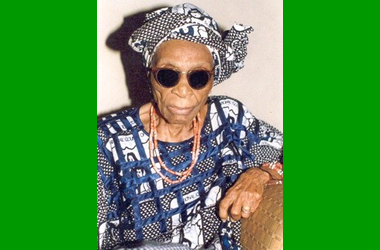Margaret Ekpo was a Nigerian women's rights activist, social mobiliser, a pioneering politician during the country’s First Republic and a leading member of a group of female Nigerian activists who rallied women beyond the borders of ethnic solidarity.
Early Life
Ekpo was born in 1914 in Creek Town in present-day Cross River State to Okoroafor Obiasulor (a native of Agulu-Uzo-Igbo near Awka in Anambra State) and Inyang Eyo Aniemewue, who was from the family of King Eyo Honesty II of Creek Town. With the death of her father in 1934, she could not attain an education beyond the standard six school-leaving certificate, dashing her hopes of attending a teacher training college. She subsequently settled for a tutoring job, teaching at various elementary schools until she married Dr John Udo Ekpo, a medical practitioner, in 1938.
Her determination to advance her education motivated her to obtain a diploma in Domestic Economics in 1948 at the Rathmine School of Domestic Economics in Dublin, Ireland (now the Dublin Institute of Technology) during the period her husband was taken there for medical attention. When the couple returned to Nigeria, Margaret Ekpo established a domestic science institute in Aba, Abia State where she trained young girls in dressmaking and home economics.
Political Career
Ekpo was thrust into politics by chance in 1945. Her husband was indignant with the colonial administrators’ treatment of indigenous Nigerian doctors but as a civil servant, he could not attend meetings to discuss the discriminatory practices and to fight the cultural and racial imbalance in administrative promotions. Ekpo, who had listened to her husband’s complaints, volunteered to be his representative. Soon afterwards, members of the NCNC (National Council of Nigeria and the Cameroons – later the National Council of Nigerian Citizens), at the time a nascent political party, came to address a political meeting in Aba. Ekpo was the only woman at the rally and it was there, after listening to fiery speeches by Herbert Macaulay, Nnamdi Azikiweand Mazi Mbonu Ojike (popularly known for his slogan “Boycott the Boycottables”) urging Nigerians to claim their independence from Britain, that the fire of political activism was ignited in her.
She was responsible for the formation of the NCNC women’s wing along with the wife of the leader of the party, Flora Nnamdi Azikiwe, who became its first president with Ekpo as vice-president. When Azikiwe became First Lady in 1960, Ekpo assumed the presidential post of the women’s wing. As president, she continued to lead women in canvassing for party candidates across the country, forming a formidable campaign team.
In 1953, she was nominated by the NCNC for a seat in the regional House of Chiefs and in 1954, she established the Aba Township Women's Association which she used to promote female solidarity as a platform from which to fight for the economic rights and protections of women as well as the expansion of their political rights. As leader of the ‘new market’ group, she was able to garner the trust of a large amount of women in the township and channel their energies into exerting political pressure on the government. By 1955, women in Aba outnumbered male voters in a city-wide election because of her work.
Ekpo won a seat in the Eastern Regional House of Assembly in 1961, becoming the first Aba woman to attain this achievement. Her position enabled her to fight for issues affecting women at the time, in particular the progress of women in economic and political matters such as the availability of transportation on major roads leading to markets. After a military coup ended the First Republic, she took a less prominent approach to politics.
Activism
Ekpo's growing awareness of civil rights movements for women around the world spurred her to develop the same for the women in her country and to fight the discriminatory and oppressive political and civil role colonialism played in the subjugation of women. She felt that women abroad had more of a say in political and civil matters than their counterparts in Nigeria.
She took risks that many politicians today might not take. In 1949, during a protest in Enugu at which coal miners requested a wage increase, their ring-leaders were shot by colonial officials. Ekpo got in touch with other women leaders around the country (most notably Funmilayo Ransome-Kuti) and they declared a day of national mourning for the colliery shooting victims. This helped draw attention to the incident not only in Nigeria, but also across the world.
During the demonstrations on the day of mourning, she made a fiery speech that led to her being arrested alongside her contemporaries Jaja Nwachukwu (the first Speaker of the country’s House of Representatives), Samuel Mazi and Nwachukwu Abengowe. They were harassed and threatened with deportation. In retaliation, the women of Aba threatened to set the town ablaze. Eventually, Ekpo and the others were set free.
In the early 1950s, Mrs Onyia, a prison officer, was murdered by a colleague, ostensibly for rejecting his advances. The authorities covered up the murder to avoid controversy, but Ekpo and the Aba women stormed the Enugu Prisons Department demanding to see where the deceased was buried. When the white superintendent rebuffed them, they threatened to break the prison gates and enter forcibly. They were then allowed in and ensured that the body was exhumed and an autopsy carried out. The truth was unveiled and the guilty warder executed.
Honours and Awards
In 2001, the Calabar airport was named after her. Her name graces the Ekpo Refectory at the University of Nigeria, Nsukkaand various other buildings and structures across the nation. Until her death, she was the Life Patron of the National Council of Women Societies (NCWS).
Death
Ekpo died at the age of 92 on September 21, 2006 at the University of Calabar Teaching Hospital.
Sources

